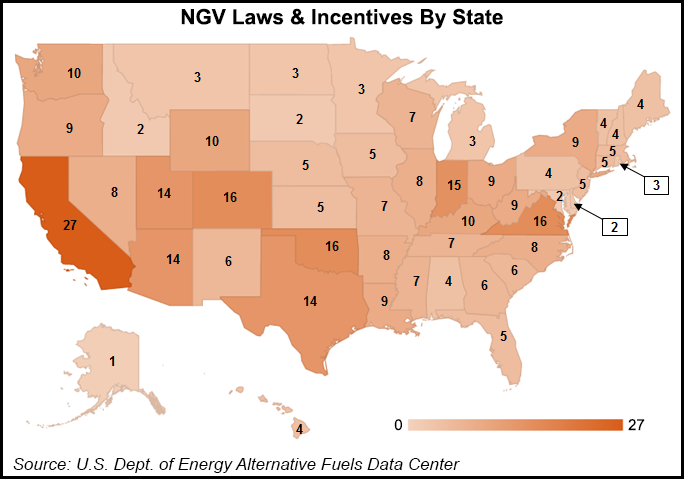Clean Vehicle Push Hits High Road in California, Nation’s Capital
The California Air Resources Board (CARB) last Tuesday approved a $373 million investment strategy for funding advanced technology in fiscal year 2015-2016, ranging from clean fuel heavy-duty trucks and buses to consumer rebates for low- and zero-emission passenger vehicles.

In addition, the California Energy Commission (CEC) extended to July 15 its deadline for submittals to its proposed $100 million budget for the state’s Alternative and Renewable Fuel and Vehicle Technology Program. CARB’s program has been increased by $150 million from last fiscal year.
CARB’s latest proposal would allocate $200 million for light-duty vehicles and $167.5 million for the heavy-duty sector. The remaining $5.5 million covers administrative overhead for the program.
In extending its comment period, the CEC said it is looking for new funding projects that are outside of the traditional alternative fuel program, including suggestions for small grants of $150,000 each. In the meantime, energy commission staff has scheduled a meeting for July 9 to review the state Natural Gas Vehicle Incentive Project, looking at future programs to fund in that section of the broader alternative fuel vehicle technology program.
Across the country, the federal Clean Cities chapter in Washington, DC, is gearing up for a July 28 workshop in the nation’s capital where Washington Gas Light is planning to open three public-access compressed natural gas (CNG) fueling stations this year — two in nearby Maryland and one in the district.
The new stations in and around the capital are in addition to a new CNG station near Dulles International Airport in northern Virginia.
Called “Filling the Holes in the Greater Washington Region’s CNG Fueling Infrastructure,” the workshop will be conducted at the DC Fleet Administration’s facilities in the northeast part of the district. The session aims to demonstrate how the additional CNG stations can be more fully used by the region’s natural gas vehicles (NGV) and attract more fleet operators to convert to NGVs.
Back in California, CARB recently certified American Power Group’s (APG) dual-fuel (natural gas-diesel) engine conversion equipment. APG said the certification opens the door for selling its conversion equipment for 17 specific engine models made by Volvo/Mack in its D-13/MPS8 line for model years 2010-2012.
The new certifications apply to 12.8-liter diesel engines ranging from 375 to 505 hp, said APG officials, adding that these are in addition to existing federal Environmental Protection Agency certification for various Caterpillar, Cummins, Detroit Diesel, Daimler, Mack and Volvo engine families.
Hybrids were part of a new large order of clean fuel New Flyer buses. Seattle’s King County Metro ordered 138 buses, including 85 60-foot diesel-fueled Xcelsior hybrids and the rest other alternative fueled buses, while the Massachusetts Department of Transportation made a $222.2 million purchase of 325 40-foot hybrid and CNG buses.
Massachusetts Bay Transportation Authority will get 150 40-foot hybrids and 175 40-foot CNG buses as part of a major step the public transportation operator is taking to “modernize its bus fleet,” according to state Secretary of Transportation Stephanie Pollack. Deliveries start this month and run through June 2016.
In Canada, Waterloo, the Ontario-based operations for Waste Management, launched a new effort, adding CNG refuse trucks to the fleet. It has 79 CNG trucks now, and plans to increase that total to 111 late this year. The new roll-off refuse trucks are made by Freightliner; front-end collection vehicles are from Mack mostly and some from Peterbilt.
Overall in North America, Waste Management has 4,100 NGV trash trucks, among a fleet of trash and support vehicles numbering more than 32,000. More than half of the vehicles are dedicated to refuse collection.
Elsewhere, Oklahoma-based Sparq CNG said it has made its first deal for establishing a fueling outlet in its native state. It plans to open a CNG station at an existing Hutch’s convenience store location in Watonga, OK, late this year.
Separately, the company partnering with retailers for CNG fueling stops said it has secured new backing from Tulsa-based Dericks Leasing & Financial, a backer of mid-size and start-up companies primarily in the energy space. Dericks has more than $30 million invested in fueling equipment at convenience stores.
“We saw that there was a dearth of capital looking to support and finance and invest in CNG opportunities,” Dericks’ principal executive, Richard Dericks, told the Fleets & Fuels newsletter. He said company is also looking to invest in fuel conversions and a separate liquefied natural gas project.
© 2024 Natural Gas Intelligence. All rights reserved.
ISSN © 1532-1231 | ISSN © 2577-9877 |
